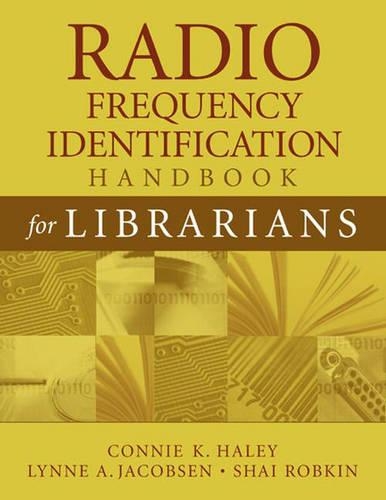
Radio Frequency Identification Handbook for Librarians
(Paperback)
Publishing Details
Radio Frequency Identification Handbook for Librarians
By (Author) Connie K. Haley
By (author) Lynne A. Jacobsen
By (author) Shai S. Robkin
Bloomsbury Publishing PLC
Libraries Unlimited Inc
30th March 2007
United States
Classifications
Professional and Scholarly
Non Fiction
025.00285
Physical Properties
Paperback
176
Description
The popularity of Radio Frequency Identification (RFID) technology has increased as its cost has decreased and the growth shows no signs of abating. Academic and public librarians wishing to convert to RFID technology will find in this book the background they need to ask the right questions of prospective vendors, such as: ; Why should my library consider implementing RFID ; What components make up an RFID system ; How do I select a vendor ; How do I manage a barcode-RFID conversion project
Reviews
The authors--two technical service librarians and a library vendor--introduce readers to RFID technology with an overview of implementation considerations including pros and cons. They also cover the RFID data model, privacy and security issues, the types of tags and readers available--including self-checkout and automated return/sorting systems--vendors, and managing a conversion project that uses existing barcode data. The appendixes include a Frequently Asked Questions section, a budget sheet, conversion guidelines, and a listing of RFID web resources. Overall, this book offers a thorough treatment of the subject and will be useful for libraries considering RFID. * Library Journal *
Because of both the breadth and the depth of the information presented, this handbook could very nearly servce as a sole source for someone undertaking an RFID project. It covers all aspects of the technology and is very thorough in answering nearly every conceivable question a librarian might have when considering conversion to an RFID system. This guide is well-written and informative, and highly recommended for academic and public librarians interested in learning the basics of RFID or wishing to implement a system of their own. * Reference & User Services Quarterly *
The issue of whether and how to implement RFID in libraries is timely and pertinent to space planning as well as technology planning.This handbook is clearly written and makes techincal information easily understandable. The liberal use of lists, photographs, charts, and diagrams adds value for communicating with and training project teams. The author successfully present a professional tone that makes the information clear for any type of library and does not show bias for particular vendors.I highly recommend this handbook for any librarian who may participate in an RFID decision or implementation project. * Technicalities *
This book provides some good hints and tips and gives a useful summary of this technology. As part of preliminary background reading this book provides some very useful technical information. * Library Review *
Haley, a system librarian at Chicago State University Library, provides background on the technology and benefits of radio frequency identification (RFID) technology in this guide for academic and public librarians wishing to convert to RFID technology. After a brief overview of how RFID technology works and its use in the retail environment, the guide discusses technical implementation issues for libraries as well as political and social concerns, costs, and physical logistics. Types of tags and readers are described, and there is advice on selecting a vendor. A final chapter outlines steps for managing the RFID conversion project. Appendices offer FAQs, sample budgets and conversion guidelines, and lists of web sites for RFID manufacturers, organizations, and news. * Reference & Research Book News *
Radio Frequency Identification Handbook for Librarians is perfect for librarians wishing to convert to RFID technology. * Library Media Connection *
This practical, clearly written guide will be helpful for librarians who are considering RFID systems for their institutions. * Public Libraries *
Author Bio
Connie Haley is Director for Information Systems and Technical Services at Chicago State University. She is an educator and librarian with 30 years experience in education, library, and information technology. Her experience includes teaching, management information systems, technical service and project management, such as the RFID conversion project. She has worked with Florida's Lee County Library Systems and Triton College in the Chicago area. Her research interests relate to library technologies, professional development, libraries in an online learning environment, and lifelong learning. Lynne A. Jacobsen is Director of Technical Services at the Warren-Newport Public Library in Gurnee, Illinois. Shai Robkin is President of Vernon Library Supplies.
